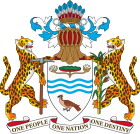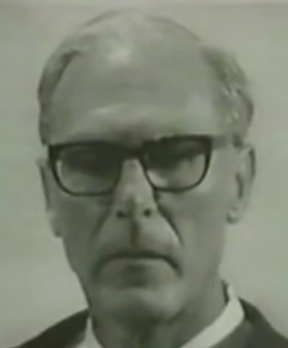 |
|---|
| Constitution |
The National Labour Front (NLF) was a political party in Guyana.
 |
|---|
| Constitution |
The National Labour Front (NLF) was a political party in Guyana.
The NLF was established by Lionel Luckhoo in 1956 after a split in the United Democratic Party. [1] [2] [3] Luckhoo was persuaded to establish the party by wealthy anti-communist Indo-Guyanese, and it ran on an anti-independence platform, opposing the People's Progressive Party. [3]
In the 1957 general elections it was the only party to nominate a candidate in all 14 Legislative Council seats, [4] and had a large campaign budget. [3] The party received 12% of the vote, winning only a single seat in the North Western District constituency, taken by Stephen Campbell, [4] who became the first Amerindian member of the Guyanese parliament. [5]
The party did not run in the 1961 elections, but returned to contest the 1964 elections. However, it received only 177 votes and failed to win a seat. [6] The party did not contest any further elections. [7]
The history of Guyana begins about 35,000 years ago with the arrival of humans coming from Eurasia. These migrants became the Carib and Arawak tribes, who met Alonso de Ojeda's first expedition from Spain in 1499 at the Essequibo River. In the ensuing colonial era, Guyana's government was defined by the successive policies of Spanish, French, Dutch, and British settlers. During the colonial period, Guyana's economy was focused on plantation agriculture, which initially depended on slave labor. Guyana saw major slave rebellions in 1763 and 1823. Following the Slavery Abolition Act of 1833, 800,000 enslaved Africans in the Caribbean and South Africa were freed, resulting in plantations contracting indentured workers, mainly from India. Eventually, these Indians joined forces with Afro-Guyanese descendants of slaves to demand equal rights in government and society. After the Second World War, the British Empire pursued policy decolonization of its overseas territories, with independence granted to British Guiana on May 26, 1966. Following independence, Forbes Burnham of the rose to power, quickly becoming an authoritarian leader, pledging to bring socialism to Guyana. His power began to weaken following international attention brought to Guyana in wake of the Jonestown mass murder suicide in 1978.

Cheddi Berret Jagan was a Guyanese politician and dentist who was first elected Chief Minister in 1953 and later Premier of British Guiana from 1961 to 1964. He later served as President of Guyana from 1992 to his death in 1997. In 1953, he became the first person of Indian descent to be a head of government outside of the Indian subcontinent.
Brindley Horatio Benn, CCH was a teacher, choirmaster, politician, and one of the key leaders of the Guyanese independence movement. He was put under restriction when the constitution was suspended in 1953. In 1957, Benn served as Minister of Community Development and Education in the first elected government of Guyana, and between 1961 and 1964 as Minister of Natural Resources. From 1993 to 1998, he served as High Commissioner of Guyana to Canada.

Janet Rosenberg Jagan was an American-born Guyanese politician who served as the President of Guyana, serving from December 19, 1997, to August 11, 1999. She was the first female president of Guyana. She previously served as the first female Prime Minister of Guyana from March 17, 1997, to December 19, 1997. The wife of Cheddi Jagan, whom she succeeded as president, she was awarded Guyana's highest national award, the Order of Excellence, in 1993, and the UNESCO Mahatma Gandhi Gold Medal for Women's Rights in 1998.

Hugh Desmond Hoyte was a Guyanese politician who served as Prime Minister of Guyana from 1984 to 1985 and President of Guyana from 1985 until 1992.

Linden Forbes Sampson Burnham was a Guyanese politician and the leader of the Co-operative Republic of Guyana from 1964 until his death in 1985. He served as Premier of British Guiana from 1964 to 1966, Prime Minister of Guyana from 1964 to 1980 and then as the first Executive President of Guyana from 1980 to 1985. He is often regarded as a strongman who embraced his own version of socialism.

Elections in Guyana take place within the framework of a multi-party representative democracy and a presidential system. The National Assembly is directly elected, with the nominee of the party or alliance that receives the most votes becoming President.

The People's Progressive Party/Civic (PPP/C) is a major political party in Guyana. As of 2020, the party holds 33 of the 65 seats in the National Assembly and forms the government. It has been the ruling party in the past as well, most recently between 1992 and 2015. In Guyana's ethnically divided political landscape, the PPP/C is a multi-ethnic organization that is supported primarily by Indo-Guyanese people.
United Force (UF) is a conservative and economically liberal political party in Guyana. It currently has no representation in the National Assembly and is led by Marissa Nadir.

Sir Lionel Alfred Luckhoo was a Guyanese politician, diplomat, and well-known lawyer, famed for his 245 consecutive successful defences in murder cases. He was the brother of the last Governor-General of Guyana, Sir Edward Luckhoo.

The Constitution of Guyana is the highest governing document in the Republic of Guyana. It came into effect on October 6, 1980, replacing the constitution enacted in 1966 upon its independence from the United Kingdom. The current Constitution of Guyana contains 12 chapters that are further divided into 232 articles. It also contains a preamble and an oath. Since its 1980 enactment, it has gone through multiple amendments.

General elections were held in British Guiana on 27 April 1953. They were the first held under universal suffrage and resulted in a victory for the People's Progressive Party (PPP), which won 18 of the 24 seats in the new House of Assembly. Its leader, Cheddi Jagan, became Prime Minister.
The Progressive Youth Organisation of Guyana is a youth organisation in Guyana, the youth wing of the People's Progressive Party. The membership of Progressive Youth Organisation (PYO) is predominantly Indo-Guyanese, like its mother party.

The Justice Party was an Indo-Guyanese political party in British Guiana.

The Manpower Citizens' Association was a trade union and political party in British Guiana.

The Political Affairs Committee (PAC) was a political party in British Guiana.
Balram Singh Rai was a Guyanese politician. He served as Minister of Community Development and Education from 1959 to 1961, then the first Minister of Home Affairs from 1961 to 1962.

Peter Stanislaus D'Aguiar was a Guyanese-Portuguese businessman, conservative politician, and minister of finance from 1964 to 1967.
Isahak Basir CCH was a Guyanese historian who was a member of the National Assembly of Guyana from 1977 to 1991. Basir was nicknamed "Uncle Tabrak" and was of Indian descent.